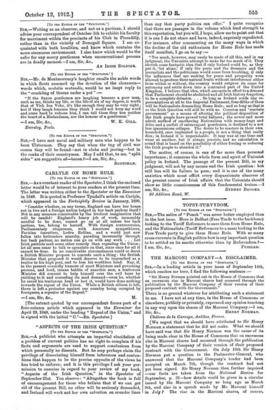CARLYLE ON HOME RULE.
[To THE EDITOR OF THE "SPECTATOR'] SIR,—As a constant reader of the Spectator, I think the enclosed letter would be of interest to your readers at the present time. The letter was written either to the Spectator or the Examiner in 1848. It is quoted in Professor Tyndall's article on Carlyle, which appeared in the Fortnightly Review in January, 1890.
"Consider whether, on any terms, England can have her house cut in two and a foreign nation lodged in her back parlour itself ? Not in any measure conceivable by the liveliest imagination that will be candid ! England's heavy job of work, inexorably needful to be done, cannot go on at all unless her back parlour, too, belong to herself. With foreign controversies, Parliamentary eloquences, with American sympathizers, Parisian emeutiers, Ledru Rollins, and a world just now fallen into bottomless anarchy, parading incessantly through her back parlour, no nation can go on with any work. . . . Let Irish patriots seek some other remedy than repealing the Union ; Iet all men cease to talk or speculate on that, since once for all it cannot be done. In no conceivable circumstances could or durst a British Minister propose to concede such a thing : the British Minister that proposed it would deserve to be impeached as a traitor to his high post, and to lose his worthless head. Nay, if, in the present cowardly humour of most Ministers and governing persons, and loud, insane babble of anarchic men, a traitorous Minister did consent to help himself over the evil hour by yielding to it and conceding its mad demand—even he, whether he saved his traitorous head or lost it, would have done nothing towards the repeal of the Union. While a British citizen is left, there is left a protestor against our country being occupied by foreigners, a repealer of the Repeal."
The extract quoted by our correspondent forms part of a four-column article which appeared in the Examiner for April 29, 1848, under the heading " Repeal of the Union," and is signed with the initial " C."—ED. Spectator.]










































 Previous page
Previous page